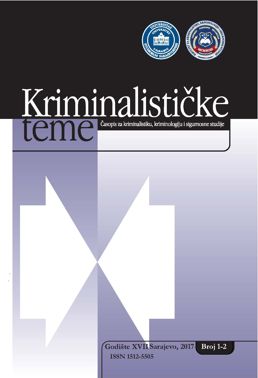NEKI ASPEKTI STRATEGIJE KRIMINALISTIČKOG ISTRAŽIVANJA OSUMNJIČENIKA ZA KAZNENA DJELA UBOJSTVA
SOME STRATEGIC ASPECTS OF CRIMINAL INVESTIGATION OF SUSPECTS FOR HOMICIDES
Author(s): Josipa Pavliček, Robert PrpićSubject(s): Criminal Law, Criminology, Penal Policy
Published by: Fakultet za kriminalistiku, kriminologiju i sigurnosne studije Univerziteta u Sarajevu
Keywords: Criminal investigation; murders; startegic directions; education;
Summary/Abstract: Reason(s) for writing and research problem(s): The inspiration for writing the article were questions related to the definition of a criminal investigation strategy of suspects for murders as one of the key segments from which depends the quantity and quality of evidence needed for criminal proceedings. Aims of the paper (scientific and/or social): The main aim of the article is to determine the investigative and evidentiary actions undertaken during the criminal investigation of murder suspects as well as the organizational aspects of the implementation of these actions. Methodology/Design: Apart from studying recent literature, the central part of the work consists of a survey carried out on a sample of 36 police files of murders committed in the period 2009-2013. For the purposes of research, a separate questionnaire was prepared. The questionnaire was with data from the police files filled. The data collected during the research were processed and analyzed with basic statistical methods. Research/paper limitations: Immediate presence of researchers during complex crime investigations could provide a better insight into the structure of more complex criminal investigations of murders because most of the relevant decisions that have been made are not documented in official police records but in personal notebooks of police officers. Results/Findings: The results of the research show that during the criminal investigation only basic investigative actions (investigative interviews with citizens and suspects, various suspects’ checks and searches in the narrower and wider area of the crime scene) and evidentiary actions (crime scene investigation and temporary seizure of the objects) were applied. It is also evident the lack of application of the appropriate organizational principles in the management and decision-making process during the criminal investigation of the murder. General conclusion: The introduction of standard operating procedures could facilitate decision-making during conducting emergency criminal activities and managing this important segment of criminal investigation. Adopting standards in the criminal investigation could also be used for simpler and more complicated forms of murder criminal investigations. Research/paper validity: The article suggests that the application of organizational knowledge and skills can lead to improvements in the quality of criminal investigation of murders and a greater amount of relevant evidence for the purpose of criminal proceedings.
Journal: Kriminalističke teme – Časopis za kriminalistiku, kriminologiju i sigurnosne studije
- Issue Year: XVII/2017
- Issue No: 1-2
- Page Range: 1-15
- Page Count: 15
- Language: Bosnian, Croatian, Serbian

